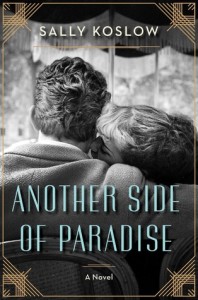
by Yona Zeldis McDonough
A Novel Imagines F. Scott Fitzgerald’s Lesser-Known (and Jewish) Love Affair
In 1937 Hollywood, gossip columnist Sheilah Graham’s star is on the rise—while literary wonder boy F. Scott Fitzgerald’s career is slowly drowning in booze. But the once-famous author, desperate to make money penning scripts for the silver screen, is charismatic enough to attract the gorgeous Miss Graham, a woman who exposes the secrets of others while carefully guarding her own. Like Fitzgerald’s hero Jay Gatsby, Graham has meticulously constructed a life far removed from the poverty of her childhood in London’s slums. And like Gatsby, the onetime guttersnipe learned early how to use her charms to become a hardworking success; she is feted and feared by both the movie studios and their luminaries.
A notorious drunk famously married to the doomed Zelda, Fitzgerald fell hard for his “Shielah” (he never learned to spell her name), who would stay with him and help revive his career until his tragic death three years later.
Working from Sheilah’s memoirs, interviews, and letters, Sally Koslow revisits their scandalous love affair and Graham’s dramatic transformation in London in her new novel, Another Side of Paradise, out this month from HarperCollins.
Koslow, the former editor-in-chief of McCall’s Magazine and author of four other novels, including acclaimed international bestseller The Late, Lamented Molly Marx, talks to Fiction Editor Yona Zeldis McDonough about how she came to uncover the secrets of Graham’s past—and why.
YZM: What drew you to the subject of Sheilah Graham?
SK: First, her Judaism. When I found out F. Scott Fitzgerald, one of my favorite authors, was in love with a Jewish woman at the end of his life and died at her home, I was fascinated. Second was the fact that “Sheilah Graham” essentially turned herself into the woman she longed to be. Self-created people always intrigue me. Sheilah could have sprung from a Fitzgerald novel.
YZM: Had you known much about her before you started your research?
SK: I’d seen passing references to Sheilah Graham in biographies about Fitzgerald, but knew nothing more about her than that she was a Hollywood gossip columnist. As soon as I began to explore her background, I thought, whoa. What a life. What a story to tell. “Sheilah” was actually Lily Shiel, born in 1904 to impoverished Ukrainian Jewish immigrants who’d moved to the ghetto-like slum of London’s Stepney Green. From age six to 14, she lived in an orphanage/boarding school run by the Jewish community, where she received her only formal education. This is simply a taste of what makes her intriguing.
YZM: Was Graham open about her religion during her time in Hollywood?
SK: Not at all. Sheilah began earning her own way in the world as a teenager in 1920s London, where anti-Semitism was rampant. Seeing Judaism as a liability, she cut ties with her roots at this point, long before she moved to the United States in the 1930s. She paid for this decision in guilt, however, and eventually came clean to Scott Fitzgerald. In doing so, she also confronted him about not-so-subtle anti-Semitic references in his books. By his last work, The Last Tycoon, his main character, Monroe Stahr, was obviously Jewish. This is the result of Sheilah’s influence.
YZM: How closely did you follow the actual facts of her life?
SK: Even the most interesting people about whom you might want to write don’t live their lives in a plot. As an author, I had to add and subtract and fictionalize dialogue, but I closely followed the fact-trail Sheilah left behind though a pile of memoirs, interviews and her syndicated columns.
YZM: Writing historical fiction presents its own particular pleasures and challenges; care to comment?
SK: I love the digging—combing through old clippings, out-of-print books, now even YouTubes from way back when. It’s so much fun that you can find yourself going down rabbit holes, never writing a word, or you get so taken with a historical footnote that you digress in your writing. So one challenge is to stay on point. Another issue is to make sure that you avoid anachronism in both details and language. You find yourself researching a picky but important point, such as when nylon stockings were first commonly available, because nothing takes a reader out of story faster than a mistake. This affects spoken and internal dialogue, as well. I just read an otherwise terrific book set mostly in the 1950s and 1960s where the author used the word “alas” about ten times.
YZM: What’s next on your horizon?
SK: Sorry. Can’t say. If I were to share what I’m noodling with now, I feel I’d be putting a kinehora on it.